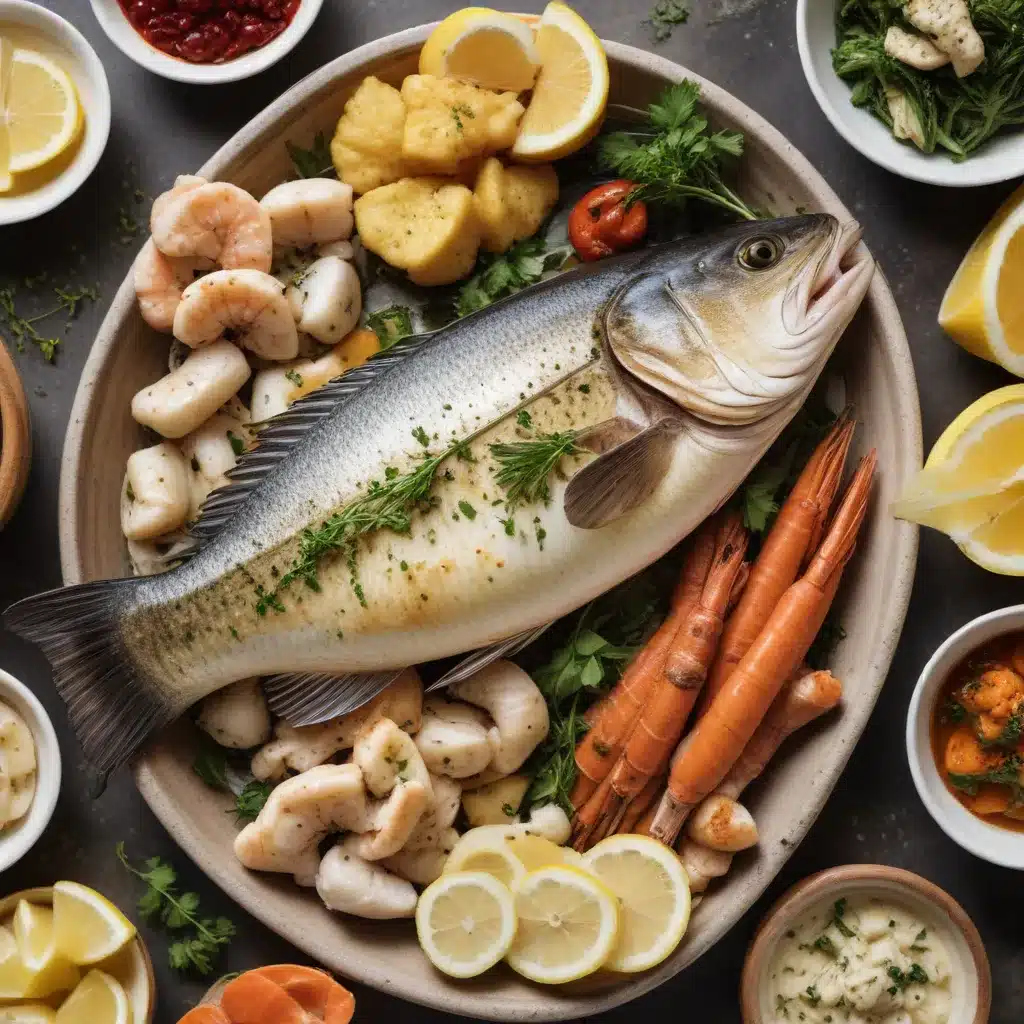
Global Seafood Cuisine
Seafood has long been a centerpiece of cultures around the world, bringing families and communities together through delicious meals and cherished traditions. From the Friday fish fry of Italian Good Friday to the midnight Easter feast of Greece, the global diversity of seafood cuisine is as vibrant as the hues of the ocean itself.
Whether it’s the lavish bacalao (salt cod) dishes of Spain, the spice-infused camarones a la diabla (spicy shrimp) of Mexico, or the colorful kinilaw (Filipino ceviche) of the Philippines, seafood has become a unifying force in celebrations worldwide. Each region celebrates its local bounty, weaving seafood into the very fabric of cultural identity.
Regional Seafood Specialties
The coastal regions of the world have long been bastions of seafood expertise, with generations of fishermen and cooks passing down prized recipes and techniques. In the American South, families gather for crawfish boils and shrimp and grits, while in New England, baked haddock and creamy clam chowder reign supreme.
Across the Atlantic, Italians indulge in the Feast of the Seven Fishes on Christmas Eve, while the Spanish savor bacalao al pil-pil (salt cod in garlic sauce) and hearty seafood stews during the Lenten season. The Greeks delight in grilled octopus and calamari as part of their vibrant Semana Santa celebrations.
Sustainable Seafood Practices
As we celebrate the global culinary traditions of the sea, it’s crucial to consider the environmental impact of our seafood consumption. Overfishing and unsustainable practices have threatened the delicate balance of marine ecosystems worldwide. However, a growing movement towards responsible sourcing and sustainable aquaculture aims to ensure that our seafood traditions can continue for generations to come.
Chefs and home cooks alike are increasingly seeking out local, seasonal seafood options, supporting small-scale fisheries and embracing a “nose-to-tail” approach to utilizing the entire catch. By making mindful choices, we can savor the bounty of the ocean while protecting its future.
Cod: A Versatile Oceanic Delicacy
One of the most beloved and ubiquitous seafood species is the humble cod. Prized for its firm, flaky texture and mild flavor, cod has become a staple in cuisines around the world, from the bacalao of Spain to the fish and chips of the United Kingdom.
Cod Fishing and Harvesting
Cod is found in the chilly waters of the North Atlantic and North Pacific Oceans, with major fishing grounds located off the coasts of Norway, Iceland, and Newfoundland. The annual cod migration and spawning patterns have long been the lifeblood of coastal communities, with generations of fishermen perfecting their craft to harvest this valuable resource.
Cod Preparation Techniques
Cod’s versatility lends itself to a wide array of culinary preparations. It can be baked, grilled, poached, fried, or even cured into salt cod. The firm texture of cod also makes it an excellent candidate for en papillote (baked in parchment paper) and sous vide cooking methods, allowing the delicate flavor to shine.
Cod in International Recipes
From the bacalao a la vizcaína (Basque-style salt cod) of Spain to the fish tacos of Baja California, cod has found its way into beloved dishes around the globe. In New England, baked cod is a classic, often served with a lemon-butter sauce or crumb topping. In the American South, cornmeal-crusted fried cod is a beloved staple.
Seafood Cultures and Customs
Seafood holds a deep cultural significance in many parts of the world, woven into the fabric of religious traditions, festivals, and communal celebrations.
Traditional Seafood Festivals
From the Feast of the Seven Fishes in Italy to the Semana Santa (Holy Week) celebrations in Spain, seafood plays a central role in many religious and cultural observances. In the Philippines, the kinilaw (ceviche) is a staple during the Lenten season, while in Brazil, bacalhau (salted cod) is a Christmas Eve tradition.
Seafood Myths and Legends
Seafood has also inspired countless myths and legends around the world. In Greece, the grilled octopus is said to be a favorite of the gods, while in Japan, the fugu (pufferfish) is revered for its delicate flavor and perilous preparation.
Seafood in Religious Rituals
The connection between seafood and spirituality runs deep. In many cultures, seafood is considered a symbol of abundance, renewal, and connection to the natural world. The Friday fish fry of the Catholic Lenten tradition is just one example of this sacred link between the sea and religious observance.
The Health Benefits of Seafood
Seafood not only delights the palate but also provides a wealth of health benefits, making it an essential component of a balanced diet.
Nutritional Value of Seafood
Seafood is a rich source of protein, omega-3 fatty acids, vitamins, and minerals. From the heart-healthy benefits of salmon to the brain-boosting properties of tuna, seafood offers a diverse array of nutritional advantages.
Seafood and Cardiovascular Health
Numerous studies have highlighted the positive impact of regular seafood consumption on cardiovascular health. The omega-3 fatty acids found in many types of fish can help lower cholesterol levels and reduce the risk of heart disease.
Seafood Consumption Recommendations
Health organizations around the world recommend incorporating two to three servings of seafood into one’s weekly diet. By making mindful choices and supporting sustainable seafood practices, we can enjoy the delicious flavors of the sea while reaping the long-term health benefits that seafood provides.
Whether you’re a seasoned seafood enthusiast or a curious novice, the world of cod and cuisine offers a rich tapestry of culinary traditions, global diversity, and health-conscious benefits. By embracing the bounty of the sea and supporting sustainable practices, we can ensure that these beloved seafood customs continue to thrive for generations to come.

